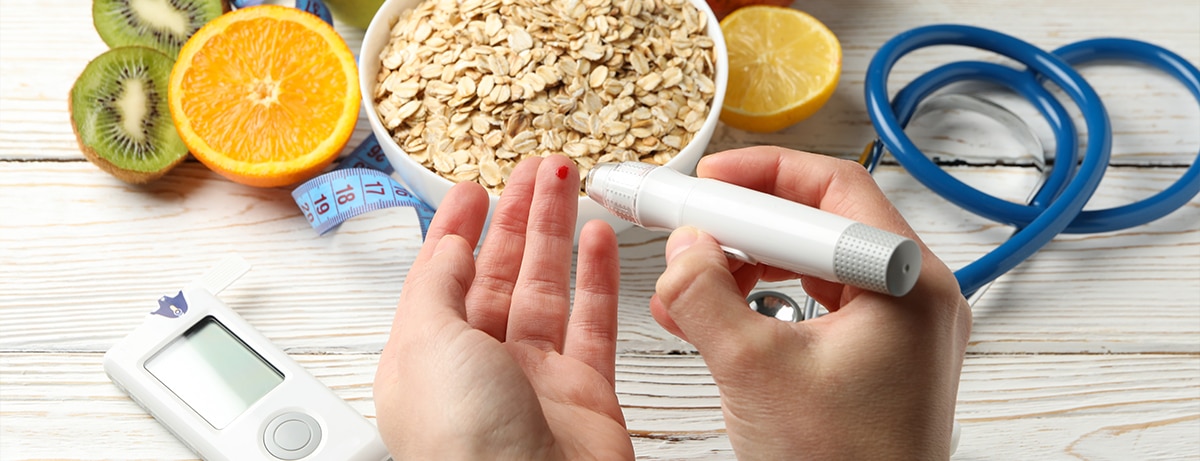10% off £35
What is blood sugar?

You may experience high and low blood sugar throughout your day, but do you know what’s causing these fluctuations? If your energy and concentration levels keep crashing, blood sugar fluctuations could be to blame – and you don’t need to have diabetes to experience those highs and lows.
Check out our complete guide to blood sugar for non-diabetics and how you can help rebalance yours.
In this article: What is blood sugar? | How does your body control blood sugar? | What is low blood sugar? | What is high blood sugar? | What are normal blood sugar levels? | What happens if your body can’t control your blood sugar? | How to check your blood sugar at home | The bottom line
What is blood sugar?
What is blood sugar?
Blood sugar, also known as blood glucose, is an important type of sugar found in your blood, and we get it by breaking down carbohydrates found in food and drink.1,2
Glucose is the primary energy source for all the cells in your body. Your brain, which uses 20% of your energy, needs a constant supply of glucose from your bloodstream to function correctly.2


How your body controls blood sugar
If you don’t have diabetes, your blood sugar naturally goes up and down during the day and night. So, for example, you’ll usually experience a temporary blood sugar spike after eating a meal. Thanks to the pancreas, the ‘control centre’ for blood glucose, our bodies are usually pretty good at controlling these peaks and troughs.3
Your pancreas produces two hormones that work in a finely tuned balance to keep blood sugar levels steady:
-
Insulin – large amounts are released when your blood sugar levels go up, for example, right after a meal, to allow your cells to take up and use glucose in the bloodstream4,5
-
Glucagon – this is needed when your blood sugar levels drop; it stimulates cells, mainly in the liver, to release stored glucose into your bloodstream to boost energy levels6,7
What is low blood sugar (hypoglycaemia)?
What is low blood sugar (hypoglycaemia)?
For many of us, it’s simply a long gap between meals or fasting. Drinking too much alcohol or being pregnant can also cause symptoms of low blood sugar, including8
- hunger
- tiredness
- shakiness
- irritability


Another cause of low blood sugar in people without diabetes is reactive hypoglycaemia, most likely caused by eating a large, carbohydrate-heavy meal. The meal can trigger an overproduction of insulin, forcing a drop in blood sugar.9
What is high blood sugar (hyperglycaemia)?
You can experience a rapid rise in blood sugar if you eat foods that score high on the glycaemic index, like white bread, cakes, and biscuits: these are broken down faster into glucose than low-GI foods, leading to a spike in blood sugar.10
However, people without diabetes are unlikely to experience these symptoms because the pancreas steps in to reduce blood sugar levels.11
If you have been experiencing the following symptoms of high blood sugar, it’s essential to see your GP to test for diabetes:12
- unusual thirstiness
- frequent urination
- tiredness
- blurred vision
- weight loss without trying
- tummy ache
- feeling nauseous, or vomiting
- fruity-smelling breath


What is the average blood sugar range?
Your blood sugar levels will fluctuate throughout the day, spiking after you’ve eaten. For those without diabetes, the normal range of blood sugar levels is13:
- Between 4 and 6mmol/L before eating a meal
- Less than 8mmol/L two hours after eating a meal
What happens if your body can’t regulate your blood sugar?
Sometimes, your pancreas cannot regulate blood sugar levels properly, which happens when you have type 1, type 2 diabetes or gestational diabetes.14
Very rarely, blood sugar regulation can also be affected by:9,12,15
- Some medications, including anti-malarial quinine, beta-blockers or steroids
- Certain health conditions, for example, hepatitis, anorexia or bulimia, kidney disorders
- Hormone deficiencies
How to balance your blood sugar
It’s essential to keep your blood glucose steady, as higher than normal levels and reactive hypoglycaemia are both linked to an increased risk of developing type 2 diabetes.16,17
These tips can help you stay in control:
- Eat carbohydrates that score low on the glycaemic index – low glycemic carbohydrates such as whole grains, most fruits, pulses, and vegetables are broken down more slowly into glucose for a gradual energy release that helps balance your blood sugar18
- Eat balanced meals – consume meals that are full of plenty of vegetables, salads, protein, and healthy fat sources. Then add in a moderate amount of your favourite carbohydrates, as suggested above!
- Exercise regularly – it has been shown to improve your body’s regulation of blood sugar and insulin sensitivity19
- Manage your stress levels – When we experience stress, our bodies produce hormones like cortisol and adrenaline. These hormones can make it harder for our bodies to regulate insulin, which is why it's important to find ways to manage and reduce stress.20
Scientists have also looked at certain herbs and ingredients , like chromium which is believed to help contribute to the maintenance of normal blood sugar levels.21
How to check your blood sugar at home
How to check your blood sugar at home
If you think your blood sugar is higher or lower than it should be, you could use an at-home kit to test your levels.
You can use at-home blood sugar test kits to give you an insight into your health and help you understand your levels better. HbA1c test kits measure your average blood sugar level over the last 3 months for a more accurate view of how your blood sugar fluctuates over time. However, it’s always essential to go to your GP for help and advice if you have any questions or concerns.
Handpicked Content: What is at-home blood testing?


The bottom line
Your blood sugar is so important for your body and well-being, but it fluctuates daily, and these highs or lows can leave you feeling out of sorts. While there are many reasons for these fluctuations, if you are worried about your blood sugar levels, you should always seek advice from a GP.
There are also at-home diabetes test kits available, which you can use at home to understand your blood sugar levels. You can even take your results with you to your GP appointments, so they give you medical advice and further insights into what they mean.
Advice is for information only and should not replace medical care. Please check with your GP before trying any interventions.
Written by Colleen Shannon on February 25, 2019, Reviewed by Dr Sarah Schenker on March 6, 2019
-
Chaunie Brusie. Healthline. Can You Have Hypoglycemia Without Having Diabetes?














